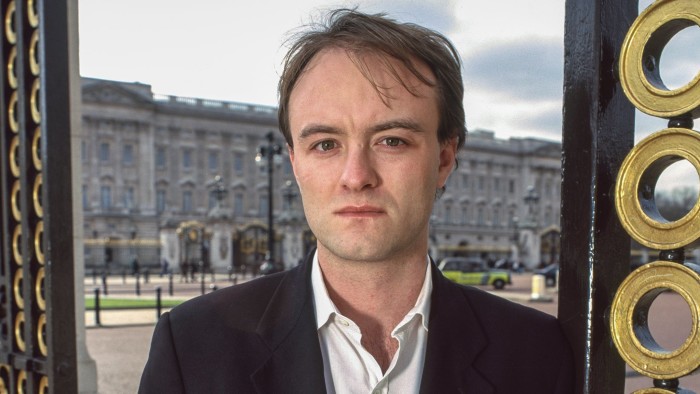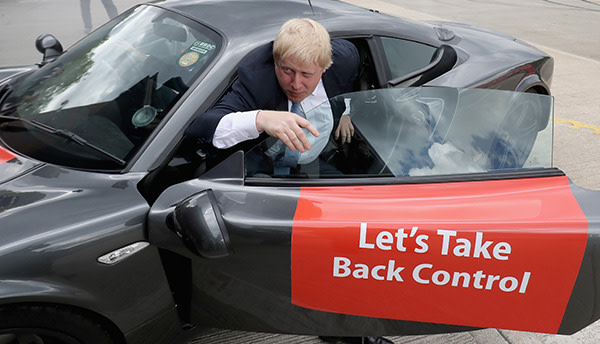Combative Brexiter who took control of Vote Leave operation

Roula Khalaf, Editor of the FT, selects her favourite stories in this weekly newsletter.
On March 14 Malcolm Pearson, the former leader of the UK Independence party, sent a message to Britain’s two rival anti-EU groups. It was a plea for a truce.
“We are not even collaborating about our core messages, whereas the Remain people are sleek, ruthless and on message,” he said in an email to Vote Leave and Leave.EU, seen by the Financial Times.
There was no reply. Even though the polls gave Remain a substantial lead, Dominic Cummings, Vote Leave’s campaign director, was not interested in collaboration. Two months later, when Lord Pearson organised a lunch for major anti-EU funders to press for unity, Mr Cummings simply ignored them, according to people briefed on events.
To outsiders, Vote Leave may have only gained prominence in February when it received the backing of Boris Johnson and Michael Gove, or in April when it beat Leave.EU to become the officially designated Out campaign.
But the group’s strategy had been shaped long before — by Mr Cummings. Drawing on his previous campaigns against the euro and a regional assembly for the north-east, the former Conservative party adviser has overseen Vote Leave’s aggressive use of statistics and social media.
It was Mr Cummings who coined the catchphrase “Vote Leave, Take Control”. The group’s initial legal name was Vote Leave, Get Change, but Mr Cummings realised that control was a more seductive message. “He came to one meeting and said, ‘we’re going to push this’,” said a colleague.
The same language had run through Mr Cummings’ earlier crusade against the single currency: he claimed the euro would be “giving away control of our economy”. In 2003 Mr Cummings was derided as a “spotty teenager”, although he was 31; but after a stint advising Michael Gove at the department of education he had become a political heavyweight.
In September 2015, Mr Cummings registered the website VoteLeaveTakeControl.org. His slogan has now been swallowed almost whole by Mr Johnson, previously one of Britain’s least-scripted politicians. In a TV debate last week, the former mayor of London used the words “take control” no fewer than seven times in his one-minute opening statement.
The Leave campaign, which trailed in opinion polls for months, has now edged ahead. Senior figures insist Vote Leave’s single-mindedness has allowed it to withstand a barrage of official statistics and prominent opponents, from Barack Obama to the Institute for Fiscal Studies. “We haven’t been panicked by the events,” says one aide.
The lessons of the 2011 No to Alternative Vote campaign — led by Vote Leave’s chief executive Matthew Elliott — have been central. That campaign made exaggerated, emotive claims about how the cost of a new voting system would undermine public services; it won a huge, unexpected majority. It also recognised that the Advertising Standards Authority had no power to regulate political ads, however misleading.
In its 2016 application to the Electoral Commission for designation, Vote Leave promised to focus on grass roots, door-to-door campaigning. “We do not regard [Facebook and Twitter] as appropriate primary platforms for this historic national debate,” it said.

Yet the campaign did not have access to large databases of political supporters — as of March, it had the details of only 43,000. It was strongest in eastern and south-eastern England. Today about 60 per cent of its activists are Conservatives and 40 per cent are Ukip, one senior activist estimates.
The effectiveness of this ground campaign is unclear. In Labour areas such as the north-east, Mr Cummings’ native region, it is reliant on Ukip activists to knock on doors. There have been fewer Vote Leave campaign events than Remain events, according to data gathered by academics including the University of Kent’s Matthew Goodwin. “You can’t run a ground campaign from an office,” said one senior Vote Leave MP, arguing that local Brexit activism has had little to do with the official campaign.
Where Vote Leave’s ability is clearer is on television and on social media. Bus tours have featured Mr Johnson in relaxed settings — buying asparagus, riding in a sports car. Vote Leave staffers are confident that, on news bulletins, this footage has at least matched the Remain campaign’s more sober efforts.
In addition, with the help of Canadian video editors, Vote Leave has also produced online videos. “You can’t trust David Cameron on Turkey,” says one clip, shared 10,000 times on Facebook. The target audience is working-class Labour voters who are distrustful of the prime minister. “So many referendums turned out to be referendums on a government mid-term,” said one aide.
The most popular videos are carefully selected TV clips. For example, Mr Cameron was generally judged to have dealt well with 30 minutes of questions from an ITV audience on June 7. But Vote Leave posted an excerpt of an audience member complaining about his record on immigration. The 36-second video — which did not include the prime minister’s response — was billed as the “highlight of tonight’s ITV debate”. It has been viewed 1.4m times on Facebook. That is substantial when compared with 4m people who watched the programme live.
Mr Cummings himself is active on Twitter, where the audience is not voters, but journalists. “Downing Street clearly in panic mode, they’ve sent out [Sir John] Major like a suicide bomber!” he commented recently when the former prime minister was interviewed on TV. “He occasionally revels in winding up the Westminster bubble,” said one Vote Leave official.
There are few checks on Mr Cummings’ power. He told MPs that Vote Leave’s funders did not influence its policies. Vote Leave’s ranks include loyal former colleagues from the department of education; some Brexiters joke that he is “boss” even to Mr Gove. John Mills, Vote Leave’s chairman, resigned in April because of Mr Cummings’ refusal to merge with Leave.EU, the preferred vehicle of Nigel Farage, the Ukip leader.
————————-
UK’s EU Referendum: How people would vote

For a more detailed summary of opinion polling visit the FT’s Brexit poll tracker page
————————-
Stephen Parkinson, head of the ground campaign and another veteran of No to Alternative Vote, is one calming influence. But that is not always sufficient. When ITV excluded Vote Leave from one debate with Mr Cameron, Mr Cummings sanctioned a late-night press release accusing the broadcaster of having “lied to us in private” and warning: “There will be consequences for its future.” The message was a warning shot at the BBC, which had yet to confirm its own debate schedule.
In another contretemps, Mr Cummings and chief executive Mr Elliott infuriated members of the Commons Treasury committee by appearing reluctant to answer questions.
Such tactics may yet backfire. Vote Leave’s misuse of statistics, particularly the erroneous claim that a British exit from the EU could free up £350m a week for the NHS, has caused the defection of one MP, Sarah Wollaston. Many undecided voters may opt for the status quo. “Being even [in opinion polls] is not necessarily a great sign for the Leave campaign,” says Gerry Gunster, a US consultant to the rival group Leave.EU.
Mr Cummings’ previous victories — helping to see off the euro and the north-eastern assembly — protected the status quo. Brexit is a bigger challenge.
Comments